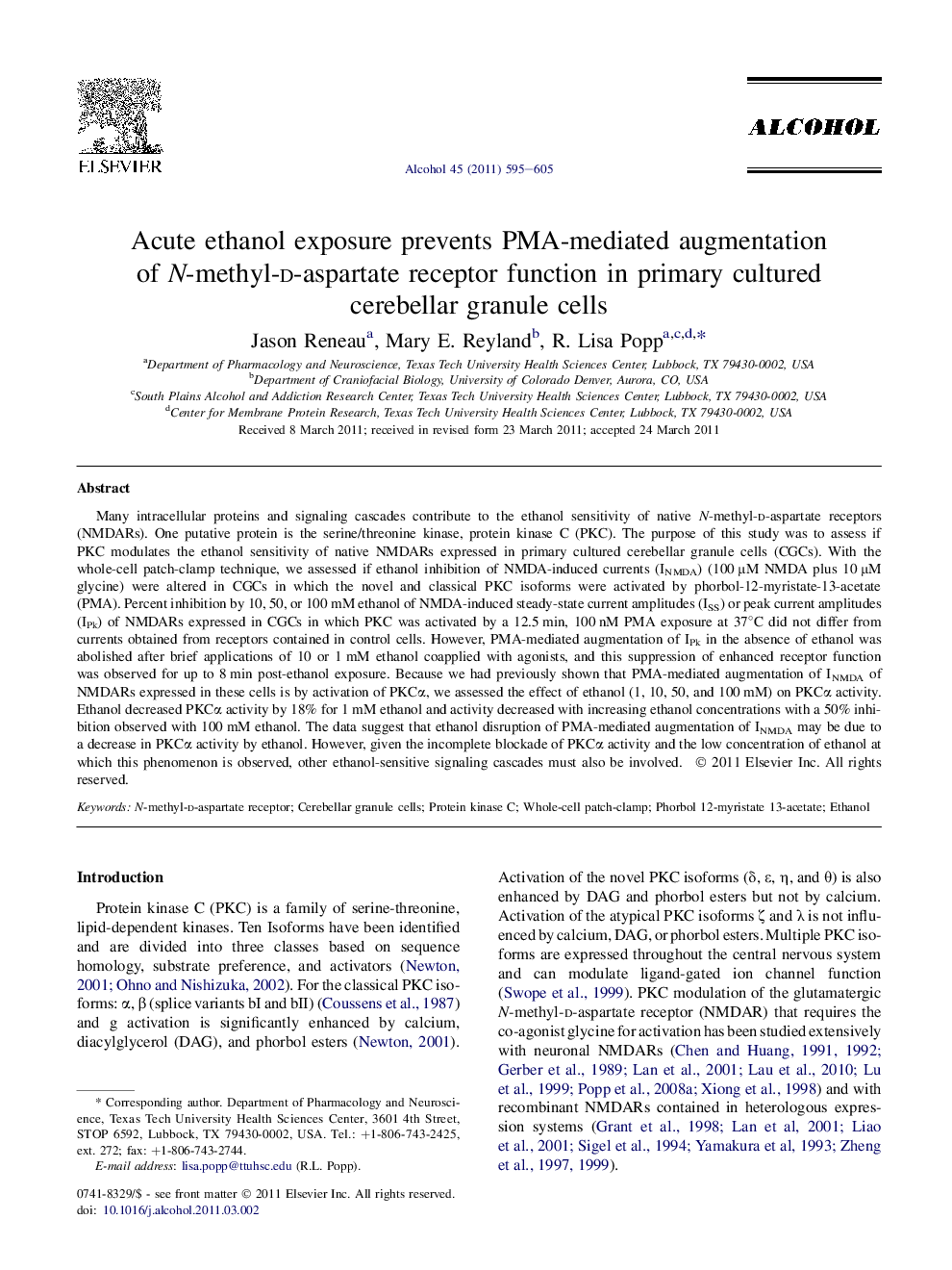| کد مقاله | کد نشریه | سال انتشار | مقاله انگلیسی | نسخه تمام متن |
|---|---|---|---|---|
| 1067029 | 948864 | 2011 | 11 صفحه PDF | دانلود رایگان |
عنوان انگلیسی مقاله ISI
Acute ethanol exposure prevents PMA-mediated augmentation of N-methyl-d-aspartate receptor function in primary cultured cerebellar granule cells
دانلود مقاله + سفارش ترجمه
دانلود مقاله ISI انگلیسی
رایگان برای ایرانیان
کلمات کلیدی
موضوعات مرتبط
علوم زیستی و بیوفناوری
بیوشیمی، ژنتیک و زیست شناسی مولکولی
زیست شیمی
پیش نمایش صفحه اول مقاله

چکیده انگلیسی
Many intracellular proteins and signaling cascades contribute to the ethanol sensitivity of native N-methyl-d-aspartate receptors (NMDARs). One putative protein is the serine/threonine kinase, protein kinase C (PKC). The purpose of this study was to assess if PKC modulates the ethanol sensitivity of native NMDARs expressed in primary cultured cerebellar granule cells (CGCs). With the whole-cell patch-clamp technique, we assessed if ethanol inhibition of NMDA-induced currents (INMDA) (100 μM NMDA plus 10 μM glycine) were altered in CGCs in which the novel and classical PKC isoforms were activated by phorbol-12-myristate-13-acetate (PMA). Percent inhibition by 10, 50, or 100 mM ethanol of NMDA-induced steady-state current amplitudes (ISS) or peak current amplitudes (IPk) of NMDARs expressed in CGCs in which PKC was activated by a 12.5 min, 100 nM PMA exposure at 37°C did not differ from currents obtained from receptors contained in control cells. However, PMA-mediated augmentation of IPk in the absence of ethanol was abolished after brief applications of 10 or 1 mM ethanol coapplied with agonists, and this suppression of enhanced receptor function was observed for up to 8 min post-ethanol exposure. Because we had previously shown that PMA-mediated augmentation of INMDA of NMDARs expressed in these cells is by activation of PKCα, we assessed the effect of ethanol (1, 10, 50, and 100 mM) on PKCα activity. Ethanol decreased PKCα activity by 18% for 1 mM ethanol and activity decreased with increasing ethanol concentrations with a 50% inhibition observed with 100 mM ethanol. The data suggest that ethanol disruption of PMA-mediated augmentation of INMDA may be due to a decrease in PKCα activity by ethanol. However, given the incomplete blockade of PKCα activity and the low concentration of ethanol at which this phenomenon is observed, other ethanol-sensitive signaling cascades must also be involved.
ناشر
Database: Elsevier - ScienceDirect (ساینس دایرکت)
Journal: Alcohol - Volume 45, Issue 6, September 2011, Pages 595-605
Journal: Alcohol - Volume 45, Issue 6, September 2011, Pages 595-605
نویسندگان
Jason Reneau, Mary E. Reyland, R. Lisa Popp,